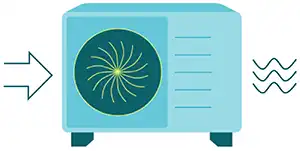Home » Business Fuel Supply & Management » Alternative Fuels Guide
The Alternative Guide:Separating alternative fuel facts from fiction
Sharing insights from across the UK’s commercial sectors, including construction, transport and public sectors
The alternative guide to navigating the new energy mix
Recent research from Certas Energy reveals that there is widespread confusion over the benefits of sustainable fuels and misconceptions over their viability as effective alternatives to diesel. We bust the myths on alternative fuels and challenge what many consider to be the biggest obstacles to wider adoption
MYTH ONE
"Alternative fuels are expensive"
58% of respondents state costs as the most significant barrier to adoption… but 46% recognise that they could deliver cost savings.
It’s true that alternative fuels cost slightly more than conventional diesel. However, as demand and supply increases, the price difference will start to decrease. They are also much cheaper to implement than other solutions that require investment in new infrastructure or vehicles.
Certas Energy’s nationwide distribution network supports the delivery of GTL Fuel across the country, with the capacity to supply up to 25 million litres of this cleaner burning alternative to diesel.
MYTH TWO
"Adopting alternative fuels would disrupt my business"
53% of businesses recognise potential disruption as one their most significant barriers to adoption… but 48% would be encouraged to use alternative fuels if there was a low implementation impact.
Drop-in diesel alternatives, such as GTL Fuel, can be used without any modifications to vehicles or engines and do not require investment in additional infrastructure.
Leading supplier to the food service sector, Brakes UK introduced GTL Fuel to their Premier Park operation in Park Royal, London, in a bid to cut vehicle emissions across the capital. Crucially for Brakes, the introduction of GTL Fuel required no vehicle modifications or changes to service intervals
Commenting on the introduction of GTL Fuel to their fleet of DAF vehicles, Steve Webster, Brakes’ Head of Indirect Goods and Services Procurement commented:
“The trial of GTL Fuel at our Park Royal depot has been running really well. The feedback from the drivers has been overwhelmingly positive – the vehicles are running more quietly and we’ve seen a substantial reduction in the need to clean the particulate filters. We have not waited for future technology either as there is no requirement to convert the vehicle. GTL Fuel is available to use straight away in all diesel engines,” added Webster, “although operators may wish to confirm with their dealer that the fuel is approved for their vehicle warranty.”
Discover how Brakes UK achieved a NOx reduction of 47% with its GTL Fuel powered Euro VI DAF fleet after intensive nine-month trial here.
MYTH THREE
"Electric is the most environmentally friendaly energy alternative"
33% are unsure if alternative fuels can reduce total cost of ownership. But GTL’s inherently cleaner burning composition has many in-use performance and cost benefits. Specifically, the technology could address the construction sector’s top two priorities after reduced emissions: odour (47%) and less noise (40%).
In addition to improving cold start performance, alternative fuels like GTL Fuel can reduce odours, noise and improve safety for users. GTL Fuel offers a number of performance benefits in addition to emissions reduction.
It has extremely low (almost zero) levels of unsaturated molecules that are present in conventional fuels such as aromatics, poly-aromatics and olefins. This can significantly elongate the regeneration cycle of Diesel Particulate Filters (DPF) – in some cases by up to 70%. The fuel is also much lower in its content of polar compounds – eg sulphur and nitrogen containing species. As a result of these unique properties, GTL Fuel has a higher cetane number, lower density and colourless and odourless characteristics.
By virtue of this high cetane number and good cold flow properties, GTL Fuel has better starting performance in cold conditions than conventional diesel.
The fuel’s more uniform combustion can also help to cut engine noise with reductions of between 3-5dB reported by some customers.
Owner and operator of Sandwich Riverboat Tours, Captain Colin Carr experienced these performance benefits first-hand when he switched his tugboat to run on GTL Fuel.
Find out how GTL Fuel helped lower emissions on the Kent Waterways and improve performance on ‘The Sandwich Tug’ here.
MYTH FOUR
"Alternative fuels can't offer any performance benefits other than reducing emissions"
4% think electric is the most biodegradable ‘fuel type’
26% think it’s the most sustainable
Electrification reduces emissions and is an integral part of the Government’s commitment to sustainability. However, it is not a zero emissions technology.
The confusion arises because the current focus is on ‘tank to wheel’ when assessing the sustainability of fuels. However, we should also consider ‘well to tank’—how fuel is produced—for a more realistic picture that considers the whole life cycle. For instance, it’s no good having electric powered vehicles if the electricity was generated using coal.
GTL Fuel has multiple benefits to help minimise its impact on the environment, being free of unwanted components such as sulphur, metals, and aromatics. Jackson Civil Engineering recently trialled the cleaner burning alternative to minimise the environmental impact during the second phase of the Environment Agency’s Perry Barr & Witton Flood Risk Management Scheme.
Commenting on the project and its use of alternative fuels, Josh Harris, Environment Agency Project Manager said: “This is a very exciting scheme, that is also proving the value of partnership working. In addition to reducing the flood risk and improving the public space for the community, Jackson can fully support us in achieving many of our environmental goals, including the use of cleaner fuels – it’s a win-win for everyone.”
Read the case study on how GTL Fuel supported the Environment Agency and Jacksons Civil Engineering in reducing harmful local emissions, noise and community impacts here.
MYTH FIVE
"A limited number of businesses are using or considering alternative fuels - why should I?"
13% of businesses say the biggest barrier is a lack of proven results around alternative fuels
69% would consider switching in the next 12 months
Adoption is growing as knowledge and supply increases. With further education, alternative fuels will become more prevalent. And as more use-cases come to market together we’ll build a more convincing case for a ‘liquid fuels’ future.
Numerous companies have already turned to alternative fuels like GTL Fuel to reduce levels of harmful emissions and minimise their impact on the environment. These include Morgan Sindall, Jackson Civil Engineering and J Murphy and Sons.
Interested in alternative fuels?
Certas Energy’s The Alternative Guide to Navigating the New Energy Mix was created to help construction, transport and public sector organisations navigate the alternative fuels landscape and separate fuel fact from fuel fiction. Download the full guide and discover the case for a liquid fuels future.






